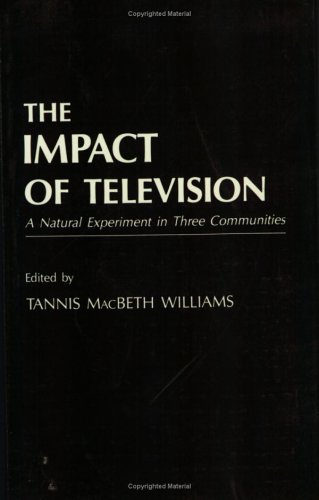Does television affect its child and adult viewers, and if so, how? This question has provoked considerable controversy ever since TV first became widely available in the 1950s. Now that most people watch television regularly, the debate is even more difficult to resolve. Do light versus heavy viewers of television differ on some measure because they use television differently, and/or because they differ on some other important characteristic (e.g., intelligence)? Do they differ because they have been influenced by TV? Or is the process of influence transactional? This book describes the results of a large research project based on an unusual opportunity to address these kinds of issues - a natural experiment involving a non-isolated Canadian town which did not obtain TV reception until late 1973. We studied three communities on two occasions, just before one of the towns obtained television for the first time and again 2 years later. The book is not, however, merely a description of who was studied, when, how, and what was found.
Our goal is to use this natural experiment to understand the processes involved in television's influence and the complexities of relationships between TV and human behavior. The effects of television are of interest to people in many fields, so we have tried to use as little jargon as possible and present the results in such a way that motivated parents, educators, policy makers, advertisers, and people in the television industry find this book readable. Its primary audience is researchers, teachers, and students in the fields of communication studies, psychology, education, and sociology. Because readers will vary in their knowledge of research methodology and statistics, we have described our findings as straightforwardly as possible in the text, tables, and figures and provided the statistical details in the appendixes and notes to each chapter. Sufficient detail is provided in the notes that they can be read either in conjunction with or independently of the text. All results discussed in the text are statistically significant, meaning they would occur by chance 5 times or less if the study was repeated 100 times.
Occasionally, a finding that would occur more than 5 but less than 10 times in 100 by chance is mentioned as marginally significant if it is of central interest. All analyses and post hoc tests were conducted to three decimals, but means reported in this book have been rounded to two places for numbers greater than 2. This innovative work describes the results of a large research project a natural experiment involving three non-isolated Canadian towns studied just before and two years after one town first obtained television reception. By comparing this town with two others - one with a Canadian channel - the other with that channel plus the three major U.S. networks - the researchers investigated television's influence on its viewers both indirectly by displacing other activities and directly via its content. The effects addressed in "The Impact of Television" include: children's thinking, vocabulary, and reading; child and adult participation in other leisure activities; children's aggressive behavior and their attitudes regarding sex roles; and adults' problem-solving behavior.
This book interests researchers, educators and students in the fields of communication, psychology, education, and sociology. It also appeals to those concerned with television in general, including people working in government agencies, the television industry and consumer groups.
- ISBN10 0127562915
- ISBN13 9780127562919
- Publish Date 28 December 1985
- Publish Status Out of Print
- Out of Print 10 April 2014
- Publish Country US
- Publisher Elsevier Science Publishing Co Inc
- Imprint Academic Press Inc
- Format Paperback
- Pages 446
- Language English
